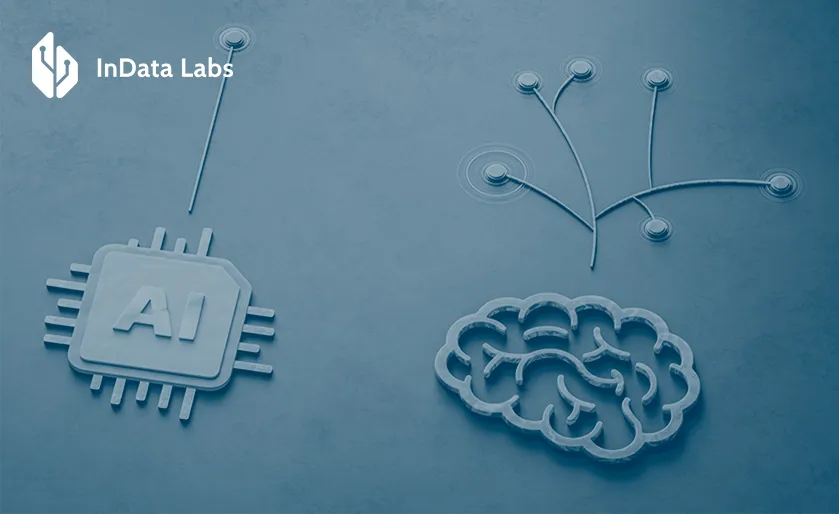The power AI can bring to business is now broadly recognized among enterprise owners. In 2025, the subject is taking the limelight as generative AI becomes ubiquitous and businesses actively look for secure methods to exploit the new technology.
Many have already started incorporating innovations driven by AI knowledge management into their workflows. Such systems take advantage of the most recent and remarkable breakthroughs in technology that complex algorithms, neural nets, and machine learning have given to this world.
The majority of businesses compete by utilizing their most precious asset — knowledge — as they adopt AI-powered knowledge management software. Not to fall behind, you may begin leveraging AI business solutions for personal gain right now, providing you understand and learn to manage the risks that it carries.
We’ve gathered a complete guide on AI-powered knowledge management systems: what they are, how they operate, what benefits they provide, how they can solve business problems, and how much they cost.
What is an AI knowledge management system?
Imagine a system that is both deeply connected to the knowledge base of your company and cognizant of the individual learning preferences, work responsibilities, and past educational experiences of every worker.
AI knowledge management systems are designed to improve the methodical process of making, arranging, preserving, and disseminating information inside an organization. They have the ability to sort through enormous volumes of data, spot trends, pick up knowledge from user interactions, and much more.
To put it simply, it simplifies the process of data processing and usage as it works faster and better than a traditional time-consuming manual approach.

How do AI-based knowledge management systems work?
Traditional knowledge management techniques were based primarily on human resources, that manually created datasets, web portals, and documentation libraries. Doubtlessly, such an approach was effort-intensive and wasteful as many errors were made and the information updates couldn’t keep up with the speed of new data emerging.
AI-powered knowledge management systems, on the contrary, utilize all kinds of sources, starting from emails and wikis to other internal databases that significantly expand their knowledge systems. After absorbing the information, the process of data collecting, scrutinizing, arranging, and classifying begins. By doing this, it is able to produce an easily navigable and well-organized knowledge base that users can dip into quickly and easily.

Source: Unsplash
The impact and role of AI in knowledge management
AI has emerged as a transformative power that has the potential to alter how businesses operate and use information. According to a Harvard Business School study, AI can boost a worker’s performance by up to 40% compared to those who do not utilize it. But this is just the beginning of the AI era. Read how artificial intelligence is changing the world:
Accelerating progress
AI knowledge management system stimulates innovation in companies and fosters an autonomous approach to managing organizational knowledge. Through the provision of tools that evaluate and link diverse pieces of information in unique ways, it promotes the discovery of new ideas and solutions and ensures the system is future-proof and self-optimizing.
Handling complex information
AI is crucial to knowledge management because it can process and analyze enormous amounts of data much more quickly than humans can. Its speed, accuracy, and predictive capabilities enable enterprises to find and use crucial insights hidden in their data, resulting in better informed and strategic decisions.
Forecasting and decision-making
AI algorithms analyze data to spot future trends and insights. This capability aids in anticipating organizational needs and is invaluable in strategic planning. By giving enterprises access to AI decision making and the most recent information, AI KM enables them to make sensible choices and stay ahead of the competition.
Companies such as Google and Amazon are good examples of this, they leverage AI to evaluate client info, market patterns, and managerial effectiveness, allowing them to stay at the forefront of technological advancement and customer happiness.

Source: Unsplash
Everlasting learning and adaptation
AI systems continuously improve comprehension by learning from user interactions and data trends. This flexibility is essential in the dynamic, fast-paced business world. AI also makes it easier to create dynamic knowledge bases. These archives guarantee that information is fresh and in line with shifting company objectives.
AI: A force for good
Not only AI adds value to your business, but it can also come up as a solution to myriads of obstacles that emerge throughout your way. Below you can read about AI business cases where the technology saved the day:
Information overload
It’s a fairly common problem nowadays—organizations frequently experience information overload as data expands at a fast pace, making it difficult to obtain accurate, up-to-date information. AI acts here as a promoted data management tool that can sort everything out.
Tacit knowledge
The state of artificial intelligence has progressed to the point that it can now analyze massive datasets and form solid judgments.
However, when it goes to the subtleties of the actual world, it fails miserably. This is when tacit knowledge emerges. It can be difficult to identify and utilize such knowledge because it tends to be out of reachability. Traditional approaches fail to formally codify and distribute this useful info, and that’s where AI takes the limelight.
Content irrelevance
User engagement may suffer if content from traditional knowledge management systems is not relevant. In order to provide individualized recommendations, AI analyzes the user’s behavior, preferences, and needs. And that’s where an AI-based recommendation system can come in. Neural networks, in particular, are capable of identifying links within a data collection by imitating the functioning of the human brain and producing tailored outputs.
Knowledge unavailability
In huge knowledge libraries, finding specific information promptly can be a challenge and result in disruptions and search failures. With AI in knowledge management all the data is in order, making it easier to access and use.

Source: Unsplash
Use AI however you like
There are many things AI can bring to the table, but finding a functional AI system becomes simple if you’re aware of the top-notch applications of generative AI. Read about numerous AI business solutions below:
Virtual assistant
Intelligent chatbots are one of the most well-known applications of generative AI in knowledge management. Virtual assistants communicate with users in a way that feels genuine and human, enabling round-the-clock contactless assistance for clients with extensive cognitive skills and self-service options.
They can answer questions right away, resolve tricky issues, and even learn from previous talks. All of this can help you surpass consumer expectations and take customer retention to the top.
Robotic process automation (RPA)
RPA may be used in knowledge management for such activities as data input, content updating, document classification, workflow optimization, and human labor reduction. RPA minimizes the probability of mistakes by automating repetitive tasks, ensuring knowledge repositories are constantly revised and secured.
Knowledge hubs
These systems are supposed to apply knowledge and produce new information based on myriads of gigabytes of accessible data and historical information that they can use in different contexts. An AI-powered knowledge management system would allow users to collect data from a variety of channels and receive conclusions about present market patterns and opponents.
Natural language processing (NLP)
Any good artificial intelligence system must have natural language processing since it enables users to communicate with the system and quickly detect the content they’ve been searching for.
NLP helps machines recognize, comprehend, and synthesize human-like language, resulting in more natural and successful interaction. It improves search functions in knowledge management by enabling users to ask questions in a natural, communicative style, leading to greater search result validity and correctness.
Organizational knowledge
Because of their management skills and speed, knowledge-based systems in AI are becoming more and more common. A top-notch AI system has to be quick at organizing and managing content and be able to categorize and tag appropriate content based on the issues that it refers to. This enhances organizational knowledge and builds a rapid yet viable system.
Hierarchical structure
If you want to get more in-depth and complete insights, knowledge graphs can be an ideal solution. They revolutionized knowledge management by providing linked representations of information, and strict structure boosted semantic comprehension, making knowledge stores easier to navigate and explore.
Advanced search
It’s common knowledge AI systems have effective search algorithms capable of swiftly finding and retrieving anything the user is looking for. Such AI-enhanced search functionality provides users with more accurate and context-aware results as well as determines the user’s needs and offers suitable solutions.

Source: Unsplash
Advanced analytics
Also referred to as augmented analytics – it transforms knowledge management by incorporating artificial intelligence and machine learning into analytics tools, conducting thorough research of the data. Augmented analytics stretches beyond typical data analysis by automating the process of finding patterns and useful correlations within knowledge sets.
How AI brings changes for the better
Once you find the right tool for your business needs, you gain access to various substantial benefits of AI-powered tools, which include the following:
Increased efficiency
AI-powered automation is streamlining knowledge capture, organization, and retrieval. This leads to improved efficiency in knowledge management processes. AI-driven chatbots and virtual assistants simplify such tasks as content tagging, updating, and maintenance, freeing up human resources for more interesting activities.
Content enrichment
AI-enabled KMS can integrate data from various sources, including emails, documents, databases, and external web content, providing an enormous repository of knowledge. AI can enrich content by adding metadata, annotations, and relevant links, making it more valuable and accessible to users.
What is more, AI systems are much faster than traditional knowledge management systems, and they can significantly impact your employees’ business processes because of their incredible capabilities for processing data.
Improved search capabilities
Even if the material is written in a language other than the user’s chosen language, AI may show users the results of their googling. AI knowledge base chatbots may also assist consumers by delivering step-by-step instructions on how to quickly get the necessary information. Additionally, via analyzing past exchanges, chatbots can provide ideas that weren’t anticipated.
Watch a video to learn more about AI chatbot capabilities:
Customer happiness
Generative AI development in knowledge management may greatly improve customer service by delivering more efficient, precise, and customized solutions. Virtual assistants have become the new black in the customer relations field: they are always at hand and ready to help – and solve problems no worse than a human.
Moreover, AI is also capable of automatically classifying customer support requests and creating guidelines to address prevalent customer concerns based on prior knowledge sources.
Options for every budget
Although AI-based knowledge systems are likely to cost more than standard knowledge management systems, their outstanding benefits make the investment worthy. For example, AI chatbot development services typically offer a variety of pricing categories, with monthly fees based on the number of users.
Overall, you won’t need to spend a fortune on a human support team when you have an AI knowledge base chatbot that can help with a number of frequent consumer questions and problems, like login info, forgotten passwords, and product specifics.

Source: Unsplash
AI can also help cut maintenance expenses through co-browsing or online support. Co-browsing is the process when support staff are able to see and communicate with the customer’s display in order to offer solutions and real-time support. Co-browsing may significantly speed up the resolution of client problems and raise the level of customer fulfillment.
Thus, AI-based knowledge management systems may improve internal employee communication, increase productivity and efficiency, provide users with lightning-fast knowledge articles, offer exceptional features, and improve customer experience with powerful virtual assistants and chatbots. They are undoubtedly the future of conducting business.
By adopting AI-powered knowledge management systems, companies can not only stay competitive but also set new benchmarks in their domain industries.
10 steps to successful AI integration
Consider integrating an AI-powered knowledge management system? It is simpler than it seems: we’ve provided you with a list of aspects to take into account so it will be easier time making the right choice:
Know your wants and needs
As always, define your objectives: what result do you want to achieve, what do you plan to do – implement customer service features, like AI knowledge base chatbot, or bring innovation and organize internal processes? The ultimate goal will show your weak spots and help you choose the technology you absolutely need to solve them.
Check your current conditions
Doubtlessly, in order to complement your situation, your first move must be an evaluation of the technology, procedures, and content used in knowledge management at present. Determine your strengths and weaknesses as well as potential growth areas. There are many ways AI may improve or supplement the existing system, but you should find the one that fits you particularly.
Find your match
Think about Artificial Intelligence chatbots, Natural Language Processing (NLP), and Robotic Process Automation (RPA) – depending on what, to your mind, your knowledge management system requires most, choose the most appropriate one. Take it seriously as it sets the direction of your company’s digital transformation process.
Put everything in order
Make sure your data is organized and prepared for AI analysis and incorporate AI technology into current knowledge libraries and datasets. Take into consideration the confidentiality and safety risks of your data to mitigate them at early stages.
Think about a platform
This is a rather important step that is usually ignored: choose a knowledge management system that enables the incorporation of AI. The platform should support user-friendly layouts, cooperation, and material structure as well as meet the needs, size, and structure of your company.

Source: Unsplash
Implement
Finally, implement algorithms by collaborating with highly qualified data engineers or AI specialists. Depending on your unique requirements, this may involve creating specific search algorithms, recommendation engines, or automation scripts.
Provide training
Introduce staff to the new AI powered knowledge management system. Explain how to use automation, make a fist of AI capabilities, and take full use of the new features. Keep in mind that AI should act as an additional tool that relieves the load and leaves space for human creativity.
Check quality twice
AI is surely a trustworthy technology, but the correctness and dependability of conclusions and insights still must be verified. Providing AI with an outlined framework that regulates the answers will do the trick. Also to make sure that all findings generated by AI models are grounded, source data should also be carefully examined.
Pilot testing
As easy as it it: to make sure the software is smooth and neat, just run a pilot test. This is how you can get valuable feedback, identify faults of the system, and optimize it to perfection. During this stage, you have an opportunity to gauge the worth of the AI features and make any necessary changes before scaling.
Keep on improving
AI is an ever-evolving technology – you’ll have to keep up with all new developments in AI technology to see what could be possible in the future. To ensure ongoing progress, create a feedback channel. Evaluate the AI-powered knowledge management system’s performance on a regular basis, collect user reviews, and don’t forget about the necessary adjustments or upgrades.
If you are still unsure what to do at this point, we offer AI management consulting to help organizations get a more profound comprehension of both inner and outer market trends as well as your own business prospects. There’s no need to do everything by yourself: we will walk you through each step to success.
Conclusion
It goes without saying that AI has changed the game significantly in the digital and business spheres. Its rapid speed, analytical prowess, capacity for prediction, and enhanced accessibility have made it a vital tool in knowledge management in 2025. AI-driven analysis revealed previously unknown patterns and trends, propelling innovation and proof-based methods.
Without a doubt, AI has a significant influence on knowledge management, helping companies maximize their resources, foster collaboration, and thrive in an information-driven world. To sum up, artificial intelligence knowledge management is more than simply a technical breakthrough; it’s an essential part of modern corporate strategy that will be necessary for organizations to stay ahead of the curve.
FAQ
-
It’s a combination of various AI technologies, machine learning, and natural language processing tools that analyze, sort, retrieve, and distribute knowledge from vast volumes of data within a business.
-
Generative AI in education can create useful material, overviews, and findings from existing knowledge archives, study abstracts, or questions from consumers. The benefits to the business can be:
- Dynamic exchange of data
- Faster accumulation of knowledge,
Effective patterns and trends spotting - Personalized suggestions and adaptive learning systems
- Overall better efficacy.
-
In addition to streamlining procedures and automating monotonous work, it can offer real-time insights that may be especially helpful. AI chatbots can help with internal staff communications and customer service, increasing productivity and speed of response.
-
Information can be collected from any source. Some methods include:
- Data mining, the process of removing information to find patterns and connections in big databases
- Natural language processing, the process of interpreting and analyzing spoken language to glean information from written texts or spoken conversations
- Web scraping, the process of gathering information from websites or other online sources in order to compile appropriate data
- Machine learning, the process of teaching algorithms to extract information from available data and gain understanding in order to carry out tasks or generate recommendations.
-
It takes the business to a higher level by eliminating human labor and leaving tedious tasks to AI systems that are able to pick out data from a variety of sources, remove noise, and make tailored recommendations.
All in all, AI improves the efficacy of operations, fosters corporate learning, and makes the business stand out.
-
It’s an AI-driven interactive agent that provides 24/7 assistance and guidance to users. It analyzes the user’s inquiry, attains the needed info from a knowledge base, and delivers accurate answers. It’s a robust and cost-efficient way to enhance customer satisfaction by offering round-the-clock help.
-
Multilingual support, 24/7 availability and a high speed of response – these are the main characteristics a good AI knowledge base chatbot should have in order to be effective and actually helpful. Also it’s preferable that an AI chatbot is as human-like and accurate as possible.
At InData Labs, we develop top-notch chatbots with a custom knowledge base, so that you can adjust it to your specific industry requests and be ahead of your competitors.



